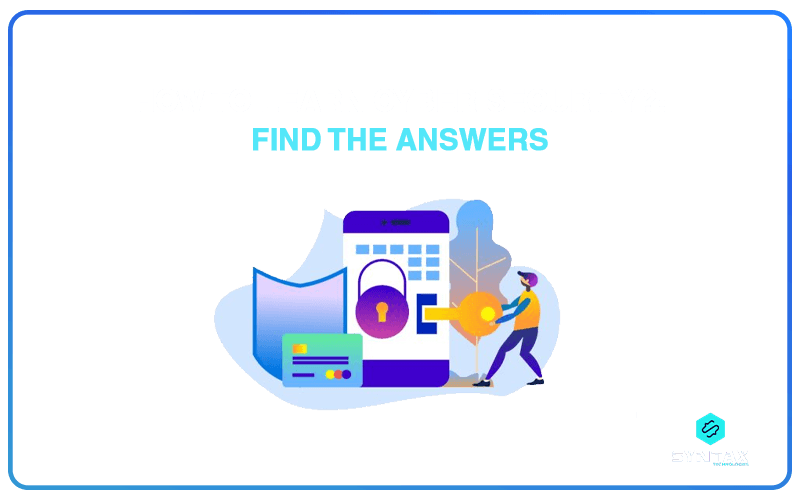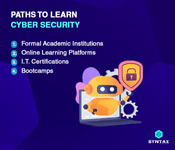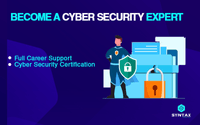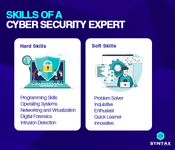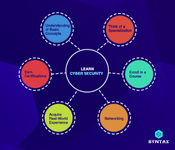Cyber Security isn’t Easy, but it Comes Down to Three Basic Principles: Protect, Detect, Respond.
The field of Cyber Security has never been this attractive before. The persistent rise in the frequency of Cyber attacks, the shortage of skilled Cyber experts as well as the limitless possibility of growth within the field, have been some of the crucial reasons why young aspirants have increasingly been thinking of how to learn Cyber Security skills.
So how to learn Cyber Security?
This can be quite a puzzling question because you might be faced with different constraints which make it difficult for you to adopt the traditional route of schools and colleges for acquiring Cyber Security education. This especially becomes a challenge if you’re already working in roles related to computer systems or aspire to become a chief information security officer.
So then, how to learn Cyber Security online?
Thankfully, there are plenty of free learning resources, online courses as well as alternative avenues, which can definitely help you in initiating your career within the Cyber Security domain. So let us try to understand how to learn Cyber Security from scratch.
In this blog, we shall try and answer the question of how to learn about Cyber Security.
We shall look at how to learn Cyber Security by considering the different options available for acquiring Cyber Security skills and Cyber Security Training. These options are especially beneficial if you have a background in computer science and are aiming to specialize.
We shall evaluate questions like how long does it take to learn Cyber Security as well as how to learn Cyber Security at home, if at all is it possible. Consequently, we shall elaborate on how to learn Cyber Security from scratch by looking at a rough roadmap.
How to learn Cyber Security: Four Main Ways
Gone are the days when walking down the school or the college corridor was the sole path for entering the career field of your choice.
This path certainly still remains one of the most preferred choices; however, there are definitely other attractive alternatives available. So how to learn Cyber Security skills without taking the formal education path. Let us try to find out.
?Schools, Colleges and Technical Institutions: Tradition or Formal Path
The formal education path still remains the first answer as you think of how to learn about Cyber Security. Accordingly, you can aim for a Bachelor?s, Master?s or Associate?s Degrees.
Some of the prominent benefits associated with formal academic institutions are:
- Structured curriculum with an organized and standardized learning environment
- State-of-the-art facilities including access to technology clubs, along with proper computer hardware and software
- Opportunities for establishing meaningful connections with experienced professionals as well as potential employers
- Exposure to real-world equipment, along with regular projects and presentations
- You happen to receive formal qualification in the form of a relevant degree which is widely accepted
Some of the drawbacks of formal academic institutions are:
- Financial constraints as well as time investment
- At times the coursework is outdated
- You are solely assessed on the basis of your grades in class
- Some allege that formal institutions grant more of theoretical knowledge instead of practical knowledge
Online Learning Platforms
This is the best answer to the question of how to learn Cyber Security online.
There are numerous online learning platforms available which not only help you learn Cyber Security, but in fact, also help you in specializing in specific areas of your interest within the field of Cyber Security and emerge as seasoned Cyber Security professionals.
Some of the prominent benefits associated with online learning platforms are:
- Flexibility and Self-Paced Learning
- Relatively cheaper than formal institutions and even offers several pricing plans
- Can offer quick learning depending on the grasping potential of the student
- Can offer specialization directly in your area of interest
Some of the drawbacks of online learning platforms are:
- Acquiring skills is dependent on the learning potential of the student
- Requires considerable self-discipline
- Self-paced learning can at times be de-motivating
- Lack of formal qualifications
I.T. Certifications
I.T. Certifications can be extremely useful as you think of how to learn Cyber Security, especially when you happen to lack a conventional STEM degree or industrial experience. I.T. Certifications are considered to be crucial in increasing the marketability of your Cyber Security skills.
They act as testimony to your expertise in specialized areas within the domain of Cyber Security. Accordingly, you have to decide upon the specific I.T.
Certification which you want to pursue and decide upon the manner in which you can learn the coursework as well as prepare for the certification exam.
Some of the prominent benefits associated with I.T. Certifications are:
- Structured curriculum within an organized learning environment
- Relatively cost-friendly when compared to formal institutions
- Updated training with defined objectives
Some of the drawbacks of I.T. Certifications are:
- There is always the possibility of not being able to earn the I.T. Certification
- Time investment
- The entire learning process happens to be Exam Centric
- There is less opportunity of working with Real-Life Equipment
- In order to stay updated, you need to depend on Continuous Education
Bootcamps (Online or In Person)
The option of formal academic institutions and I.T. Certification lie at two extreme ends. While the first option is quite rigid and may entail higher financial investment; the second option demands serious self-discipline. So, one attractive option which has emerged in recent times for all those thinking of how to learn Cyber Security from scratch, is that of bootcamps.
Some of the prominent benefits associated with Bootcamps are:
- Structured curriculum with formal classroom environment
- 1:1 Mentorship, along with connection with course instructors
- Affordable payment plans
- Flexible Schedule
- Defined course objectives, along with access to real-world equipment
- Networking opportunities
- Recognizable Certification
Some of the drawbacks of Bootcamps are:
- They are relatively short in duration
- They might be considered as expensive, if you are thinking how to learn Cyber Security on your own by relying on self-learning resources
- The location of the Bootcamp is dependent on the city, especially if it is an in-person one
Syntax Technologies happen to be one such excellent Bootcamp, offering top notch training in the field of Cyber Security. Apart from providing state-of-the-art facilities, it helps you develop expertise in consonance with that of a Cyber Security expert, right from the comfort of your homes. Enroll today.
How long does it take to develop Cyber Security Skills?
As you are thinking of how to learn Cyber Security, it is important to consider the duration which might be tentatively required for you to learn Cyber Security. It is generally suggested that it usually takes a year or two to acquire appreciable command over the discipline. However, this is not a fixed statement.
The duration will be influenced by several factors, among which, the nature of the educational path that you opt for is an important factor. If you go by the conventional formal institution route, it would take you four to five years to earn a bachelor?s degree, with another two years for a master?s.
If you opt for bootcamps, it might take you somewhere around 6 months to a year to wind up the course. However, if you choose the self-learning path, it might take you much longer to be in a position to develop commendable command over the field.
For individuals with no prior experience or knowledge, it can take several months to a year to develop foundational cyber security skills, such as network security, risk management, and incident response. However, with dedication and consistent effort, it is possible to gain proficiency in these areas within a relatively short amount of time.
More advanced skills, such as penetration testing, reverse engineering, and cryptography, may require years of study and practice to master. In addition, cyber security is a constantly evolving field, and professionals must continuously update their skills and knowledge to stay current with the latest threats and technologies.
How to acquire Cyber Security Training at home: Is it Possible?
When you are thinking of learning Cyber Security from home, it implies that you are puzzled with the question of how to learn Cyber Security on your own. This is definitely possible. This is possible through opting for the self-learning path.
The Internet provides you with an infinite baggage of valuable resources as well as free online courses which can easily help you in acquiring Cyber Security skills. If you are an individual who enjoys solving complex problems, has a love for technology, along with possessing the right mixture of skills and expertise; you can smoothly make your way through the Cyber Security domain and become a Cyber Security professional.
Books can be one of the best resources, especially when you are puzzled with the question of how to learn Cyber Security on your own. However, the task of choosing good Cyber Security Books can be a tiring one. Do not worry. Read our blog on ?Top 10 Must-Read Cyber Security Books?
The field of Cyber Security is definitely a technical and exhaustive one. Given so, it is quite natural to be puzzled with the question of how hard is Cyber Security. Read our blog on ?Is Cyber Security Hard?: Let us Find Out?
How to learn Cyber Security Online: A Rough Roadmap
Foundational Understanding of Basic Concepts
As you initiate on the path of thinking of how to learn Cyber Security, it is extremely important to acquaint yourself with basic understanding of some of the most important concepts within the discipline.
Accordingly, you should develop good knowledge of
- Networking: A strong understanding of networking concepts and protocols is essential for cybersecurity professionals. This includes topics such as TCP/IP, DNS, HTTP, and SSL.
- Cyber Security Laws and Regulations: Cybersecurity professionals should have a working knowledge of the relevant laws and regulations that apply to their work, such as the GDPR, HIPAA, and the Cybersecurity Information Sharing Act (CISA).
- Ethical Hacking: Ethical hacking involves using hacking techniques to identify vulnerabilities and weaknesses in a system, with the goal of improving security. Cybersecurity professionals should have knowledge of ethical hacking methodologies, tools, and techniques.
- Cryptography: Cryptography is the practice of secure communication, which includes encryption and decryption of data. Cybersecurity professionals should understand the various types of cryptographic algorithms, encryption techniques, and key management.
- Incident Response: Incident response refers to the process of detecting, analyzing, and responding to security incidents. Cybersecurity professionals should have knowledge of incident response procedures, tools, and techniques.
- Cloud Security: With the increasing use of cloud computing, cybersecurity professionals should have a good understanding of the unique security challenges and solutions that arise in cloud environments.
- Threat Intelligence: Threat intelligence refers to the process of collecting and analyzing information about potential or current threats to a system or organization. Cybersecurity professionals should be familiar with threat intelligence tools, sources, and analysis techniques.
- Mobile Security: Mobile devices present unique security challenges due to their portability and connectivity. Cybersecurity professionals should understand the mobile security landscape and be familiar with mobile device management solutions.
- Social Engineering: Social engineering refers to the use of psychological manipulation to trick individuals into divulging sensitive information. Cybersecurity professionals should be aware of the various social engineering techniques and how to mitigate them.
- Cybersecurity Governance and Management: Cybersecurity is a complex field that requires a structured approach to governance and management. Cybersecurity professionals should have knowledge of risk management frameworks, security governance models, and compliance requirements.
- Software Skills: Learning to work with different Operating Systems and Cloud based environments.
- Knowledge of different types of data, including sensitive data.
Find your Niche
The field of Cyber Security is an extremely vast one and as you seek to find answers to the question of how to learn about Cyber Security, it is important to realize that it is nearly impossible to acquire expertise in each and every area within the discipline.
Hence, it is important to narrow down your focus and choose your specialty. Some of these potential domains include Ethical Hacking, Application Security, Digital Forensics, Network Security and so on.
Enrol in a Course
If you do not want to go by the route of conventional academic institutions, you can opt for courses provided by different online platforms or bootcamps. What is important is that you should opt for a reputed and credible source for acquiring your training.
Certifications offered at the end of the course act as testimonies to your acquired expertise and skills within the Cyber Security field. While online learning platforms are an attractive option if you are thinking of how to learn Cyber Security at home; if you are concerned about how long does it take to learn Cyber Security, bootcamps can come to your rescue with their accelerated and extensive course of study.
Looking to ace a Cyber security interview like a pro? Check out our blog on “Top 40 Cyber Security Interview Questions“
Watch Out for Relevant Certifications
Recognized Cyber Security Certifications acquired at the end of a Cyber Security course, not only validate your knowledge of best practices, but also in some cases, compensate for your lack of experience or degree.
Some of the well known Certifications for Cyber Security are: Certified Information Systems Security Professional (CISSP), Certified Information Security Manager (CISM), CompTIA Security+, Offensive Security Certified Professional (OSCP) and so on.
If you wish to know about the best Cyber Security Certifications, do read our blog on ?Top 10 Cyber Security Certifications?
Practice ethical hacking
Learning how to hack ethically can be a valuable way to learn about vulnerabilities and security flaws in a safe and controlled environment. There are various online platforms that offer ethical hacking training.
Networking and Gathering Real-World Experience
As an individual who is just seeking to establish his foothold within the Cyber Security domain, it will be important for you to expand your connections in a meaningful way. At the same time, it will be worthwhile to gather hands-on experience by application of your theoretical knowledge to real world problems. One way of doing this is through participation in Cyber Security contests, such as Global Cyberlympics, Cyber Quests and so on.
Learn from experts
Follow industry experts and thought leaders on social media, read their blogs and articles, and listen to their podcasts to gain insights and learn from their experiences.
Conclusion
It is evident that the answer to how to learn Cyber Security is not a straightforward one. There is no one universal prescription which can be applied if you are seeking to learn Cyber Security on your own, or from scratch, at home or thinking of how to learn Cyber Security online. The answer will be dependent on your aptitude, existing skills, academic background, willingness to learn as well as resources at your disposal.
Syntax Technologies, offer you one of the surest ways for grabbing a coveted position with the Cyber Security domain, Read more about our Cyber Security course.
